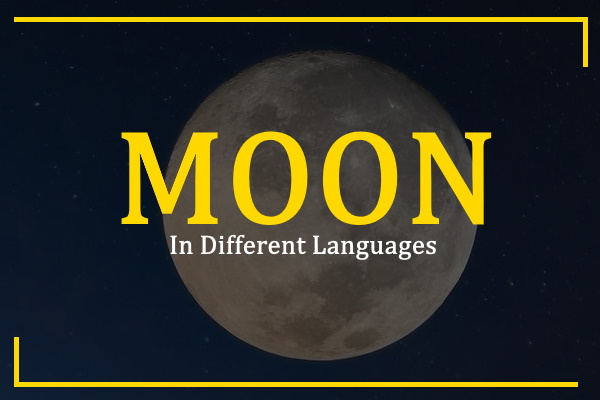Moon in Different Languages
The brightest and largest object that shines in the sky at night is moon. Moon is the only natural satellite that revolves around the earth. It is the fifth largest satellite in the world. The moon is said to be 4.51 billion years old. The proper name MOON is derived from English language.
Here is the translation of word “Moon” in other languages:
- English: moon
- Chinese: 月亮
- Hindi: चंद्रमा
- Spanish: luna
- Arabic: قمر
- French: lune
- Bengali: চাঁদ
- Russian: луна
- Portuguese: lua
- Urdu: چاند
Moon in European Languages
| Different Languages | Word Moon |
|---|---|
| Albanian | hënë |
| Basque | ilargia |
| Belarusian | месяц |
| Bosnian | mjesec |
| Bulgarian | луна |
| Catalan | lluna |
| Corsican | luna |
| Croatian | mjesec |
| Czech | měsíc |
| Danish | måne |
| Dutch | maan |
| Estonian | Kuu |
| Finnish | kuu |
| French | lune |
| Frisian | moanne |
| Galician | lúa |
| German | Mond |
| Greek | φεγγάρι [fengári] |
| Hungarian | hold |
| Icelandic | Tungl |
| Irish | moon |
| Italian | Luna |
| Latvian | mēness |
| Lithuanian | mėnulis |
| Luxembourgish | Mound |
| Macedonian | месечината |
| Maltese | qamar |
| Norwegian | måne |
| Polish | księżyc |
| Portuguese | lua |
| Romanian | lună |
| Russian | Луна [Luna] |
| Scots Gaelic | ghealach |
| Serbian | месец [mesec] |
| Slovak | mesiac |
| Slovenian | luna |
| Spanish | Luna |
| Swedish | måne |
| Tatar | ай |
| Ukrainian | місяць [misyats'] |
| Welsh | lleuad |
| Yiddish | לעוואָנע |
Moon in Asian Languages
| Different Languages | Word Moon |
|---|---|
| Armenian | լուսին |
| Azerbaijani | ay |
| Bengali | চাঁদ |
| Chinese Simplified | 月亮 [yuèliàng] |
| Chinese Traditional | 月亮 [yuèliàng] |
| Georgian | მთვარე |
| Gujarati | ચંદ્ર |
| Hindi | चांद |
| Hmong | hli |
| Japanese | 月 |
| Kannada | ಚಂದ್ರನ |
| Kazakh | ай |
| Khmer | ព្រះច័ន្ទ |
| Korean | 달 [dal] |
| Kyrgyz | ай |
| Lao | ເດືອນ |
| Malayalam | ചന്ദ്രൻ |
| Marathi | चंद्र |
| Mongolian | сар |
| Myanmar (Burmese) | လ |
| Nepali | चन्द्र |
| Odia | ଚନ୍ଦ୍ର |
| Pashto | سپوږمۍ |
| Punjabi | ਚੰਦ |
| Sindhi | چنڊ |
| Sinhala | සඳ |
| Tajik | моҳ |
| Tamil | சந்திரன் |
| Telugu | చంద్రుడు |
| Thai | ดวงจันทร์ |
| Turkish | ay |
| Turkmen | Aý |
| Urdu | چاند |
| Uyghur | ئاي |
| Uzbek | oy |
| Vietnamese | mặt trăng |
Moon in Middle East Languages
| Different Languages | Word Moon |
|---|---|
| Arabic | القمر [alqamar] |
| Hebrew | ירח |
| Kurdish (Kurmanji) | hêv |
| Persian | ماه |
Moon in African Languages
| Different Languages | Word Moon |
|---|---|
| Afrikaans | maan |
| Amharic | ጨረቃ |
| Chichewa | mwezi |
| Hausa | watã |
| Igbo | ọnwa |
| Kinyarwanda | ukwezi |
| Sesotho | khoeli |
| Shona | mwedzi |
| Somali | moon |
| Swahili | mwezi |
| Xhosa | inyanga |
| Yoruba | oṣupa |
| Zulu | inyanga |
Moon in Austronesian Languages
| Different Languages | Word Moon |
|---|---|
| Cebuano | bulan |
| Filipino | buwan |
| Hawaiian | mahina |
| Indonesian | bulan |
| Javanese | rembulan |
| Malagasy | volana |
| Malay | bulan |
| Maori | marama |
| Samoan | masina |
| Sundanese | bulan |
Moon in Other Foreign Languages
| Different Languages | Word Moon |
|---|---|
| Esperanto | luno |
| Haitian Creole | lalin |
| Latin | luna |
Video Pronunciation

Arslan Hussain, founder of The Different Languages, is an experienced translator passionate about languages and cultures. Through his website, he shares his knowledge and love for different languages, making learning accessible and enjoyable.

